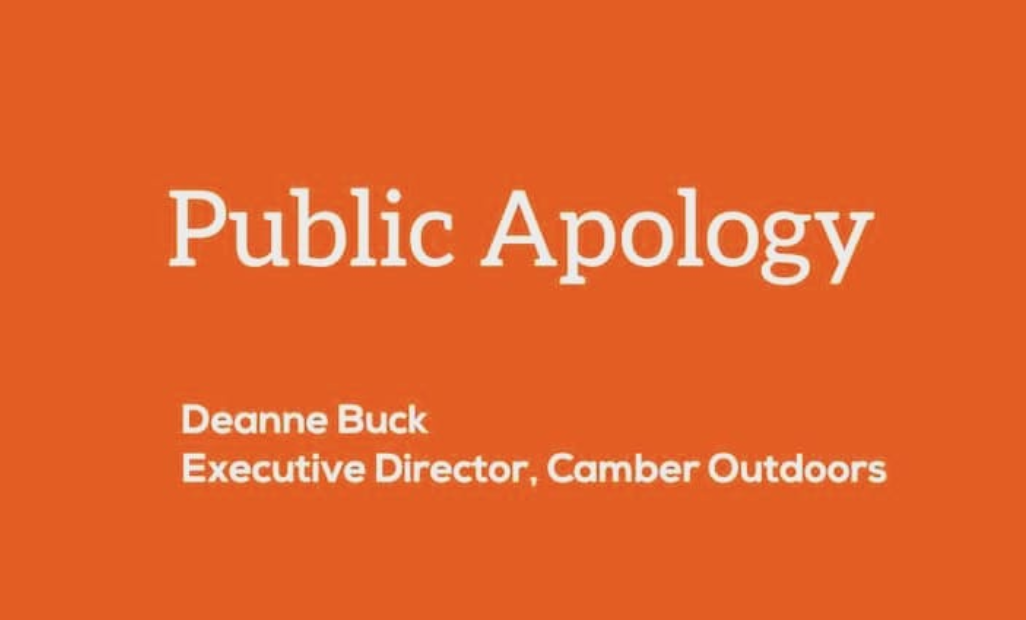On the final day of the 2019 Outdoor Retailer Snow Show last week Camber Outdoors announced its CEO Outdoor Equity Pledge. Following a panel discussion moderated by Harvey Floyd II that included Amy Roberts of Outdoor Industry Association, Kim Miller of Scarpa, Jim Weber of Brooks Running, and Wendy Yang of Hoka, Teva and Sanuk, Camber executive director Deanne Buck invited more than 60 CEOs of brands and nonprofit institutions to the stage to sign a document declaring their intention improve DEI (Diversity, Equity, Inclusion) efforts within their companies and to more directly engage under-represented sectors of the U.S. population, specifically people of color (POC).
But within minutes of the announcement social media began lighting up as people in the outdoor community expressed outrage over two glaring issues: 1) the description of this initiative as the “first-of-its-kind” and 2) the apparent absence of a critical constituency in its planning, namely people of color.
The Co-opting Controversy
As of 1 P.M. today, February 4, Camber’s website claims that its CEO Outdoor Equity Pledge is the “first-of-its-kind.” That assertion was echoed by executive director Deanne Buck on stage in her opening remarks last week.
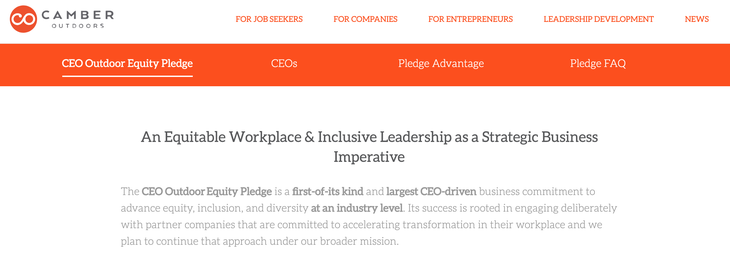
The problem is, the CEO Outdoor Equity Pledge is not the first of its kind. Understanding the timeline is important here.
Though the original CEO Pledge, first introduced by the Outdoor Industry Women’s Coalition (OIWC) in 2015, set the intentions of business leaders to promote the interests of women, that document made no reference to racial or ethnic diversity.
When OIWC was rebranded as Camber Outdoors in 2016, its mission parameters did indeed include people of color. Clearly, the organization began working more specifically on DEI issues at that point, but that language wasn’t officially codified into the CEO Outdoor Equity Pledge until Friday of last week.
In the meantime, last summer, DEI activist Teresa Baker circulated a document called the Diversity Pledge at the Outdoor Retailer Summer Market. Distributed on the website diversifyoutdoors.com since July of last year, Baker’s pledge, which currently has 23 signatories, invites CEOs to be more equitable and inclusive in their practices of recruitment, hiring, mentoring, marketing, and community engagement.
Indeed, the two pledges are very similar, at least in their intent, and this is at the crux of the heated debate. DEI had certainly been a priority for Camber since it rebranded in 2016, but Baker was definitively the first to launch a pledge aimed at diversity. By using language like “first-ever,” Buck unleashed a firestorm.
“It’s clear to me that more than 50 mostly white-led outdoor brands just publicly declared that they either preferred or were more comfortable working with a white-led organization on flipping diversity, equity and inclusion than one pre-existing one led by a black woman and supported and facilitated by other people of color,” said journalist Glenn Nelson.
“I was really frustrated because it was like once again a white organization claiming dominance upon something that’s clearly not theirs and indicating that they’re the first ones when Teresa Baker is working her ass off doing this,” said Jaylyn Gough, founder of the indigenous people’s advocacy group Native Women’s Wilderness. “You have all these groups like Brown Girls Climb and Queer Nature and Native Women’s Wellness and all of these grassroots organizations that are really working on changing the outdoor industry and what it looks like. This is nothing new.”
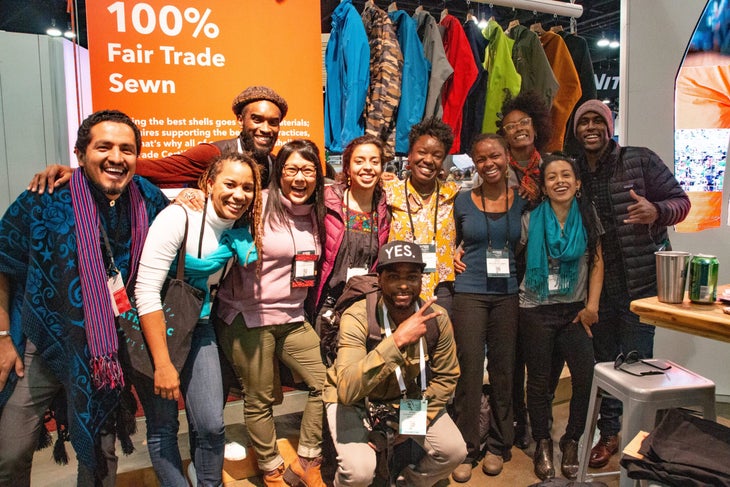
When it transitioned from OIWC to Camber Outdoors in 2016 the organization shifted its focus to include people of color. And to date Camber’s board of directors, staff, and some of its members have begun to reflect the DEI principles they aim to promote.
Shanti Sosienski Hodges is the founder of Hike it Baby, a nonprofit dedicated to getting families with infants and toddlers on the trail. Her organization has been actively working to address the interests of people of color in her community and recognizes the constant struggle to get it right. “To take on diversity, equity and inclusion and not first have it your ranks is never going to work out in your favor,” she said. “I know from experience at Hike it Baby that every time we try something in DEI without talking to people of color around us first, it ends badly and feelings are hurt.”
Hodges said had Buck and Camber not used the “first-of-its-kind” language and acknowledged the efforts of Teresa Baker and others, “We wouldn’t be having this conversation.”
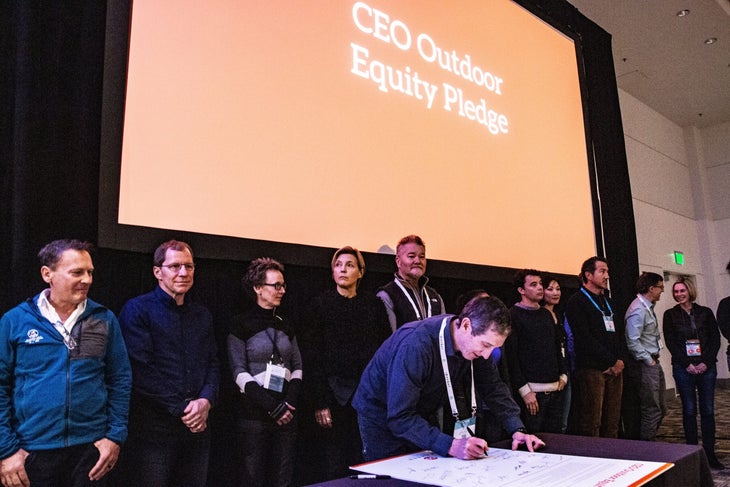
Camber Apologizes for Co-opting Language
In response to several posts on social media, Camber Outdoors has apologized.
“Upon reflection I can see how people would question ‘the first-of-its-kind.’ There are a lot of amazing efforts out there, a lot, and all of those efforts are pointing toward the same vision and the same end goal,” Buck said in a phone interview. “Collectively, it’s important that we support each other even though we might have completely different approaches. We definitely want to acknowledge the work that Teresa Baker and Diversify Outdoors have brought to the industry. It’s important. It’s valuable. It’s critical. And we apologize for anything that might have felt like we were discounting that by saying ‘first-of-its-kind’. I will be revisiting that, and in the future make sure that the tent is big.”
As we go to press, Camber has issued a public apology. “We now understand and fully regret that the language we used failed to respect and acknowledge the myriad ground-breaking efforts in the outdoor industry, especially Teresa Baker’s CEO Diversity Pledge, which launched in July 2018,” read the post on Camber’s website and Instagram account. “We were wrong in the use of the words ‘first of its kind’ and in how we positioned the initiative. We see how deeply it has impacted many people, including Teresa, and how hurtful our words were. That was not our intent. The announcement has been corrected. I have reached out to Teresa to personally extend my apology.”
Despite the apology, some members of the POC community have immediately demand that Buck step down as ED of Camber.
Were POC Involved in the Crafting of Camber’s CEO Outdoor Equity Pledge?
On the evening before the February 1 Camber event, Marinel de Jesus, a Washington D.C. based attorney and founder of Brown Gal Trekker, took to Facebook to express her disappointment in the fact that people of color were not widely involved in the creation of Camber’s pledge. “…You have not once expressed any intention to partner or work as an ally of the communities that you purportedly wish to target with your DEI efforts,” de Jesus posted in the Basecamp Facebook group and on her website. “In fact, it appears you have disregarded such voices completely without apologies. Your work groups are filled with white-led DEI propaganda with just three of us POCs as your form of tokenism present and yet our knowledge and experience on the subject matter were underutilized, but more often dismissed.”
In response to the allegations that no POC were consulted in the creation of Camber’s CEO Outdoor Equity Pledge, Buck has said that is simply not true.
One such POC is Reggie Miller, senior director, inclusion and diversity at VF Corporation and a Camber board member. “Camber Outdoors has taken great care to establish an open and active Workplace Equity Working Group and gather a broad range of stakeholders in developing the pledge, which was key to its success and has us enthusiastic about its potential,” said Miller. “We are always open to engaging with additional organizations that share our focus on making our company and industry more inclusive and welcoming to all.”
There were indeed at least two African American men (including Miller) and a woman of Asian descent on the advisory council. But many believe that more POC who have worked within the industry should have been more directly engaged in the process.
When reached for comment, Teresa Baker said all that matters to her is the outdoor industry’s commitment to DEI. Though she understands that not all businesses will adopt the principles of her Diversity Pledge she is prepared to offer guidance wherever she can.
“I am grateful for those who choose to work with me in action and not just in symbolic gestures,” Baker said. “I will not go back and forth on which course is best. I will continue to do the work and extend myself to those who wish to do the same.”
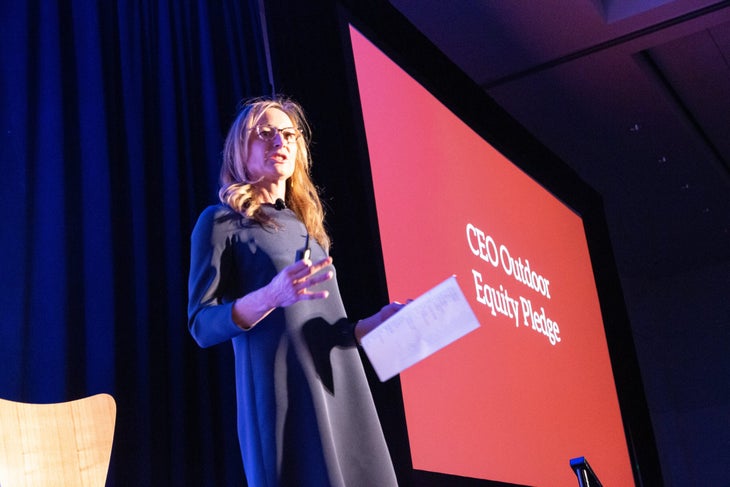
Support for Camber’s Intent
It’s important to remember that Camber Outdoors is a professional organization. Its motivations and priorities are not the same as those of activist groups dedicated to social or environmental justice. Even though the Camber CEO Outdoor Equity Pledge aims to make a business case for the value of DEI in the outdoor industry, its methods of engagement with the general public will likely differ from those of grassroots nonprofit initiatives. With a board of directors to whom she must answer, Camber executive director Deanne Buck said her organization is forging its own path to achieve many of the same objectives.
Most agree that Camber’s CEO Outdoor Equity Pledge has honorable intentions based on an overall desire to see more diversity initiatives across the outdoor industry. Those we spoke to suggest that Friday’s announcement is a positive step in the right direction.
Yero Winborne is the social media coordinator for the Greening Youth Foundation, a nonprofit that specializes in placing young people of color as interns and entry level employees at agencies of the federal government, environmental nonprofits and private businesses. “The CEO Equity Pledge has a lot of good names and faces in it,” he said, immediately following the Camber event, which he attended. “I’m not sure what policy changes we’ll see, but I’m excited that there’s something going on.”
Phil Powers, CEO of The American Alpine Club, signed the CEO Outdoor Equity Pledge because he wants to do better. “I can’t really express that I have taken on the leadership that many have in this industry,” Powers said. “But my staff has made it really clear that this is important, not just for them, but for our growth as an organization and our ability to make climbing a sport where everyone can belong. This pledge is yet another tool that cements and supports that.”
Is There a Path Forward for Cooperation?
Now that Camber has publicly apologized, Baker said she hopes the group will demonstrate their sincerity by taking direct action to achieve substantive change.
And now that both sides of this controversy have a better understanding of how each other feels, perhaps there is room for compromise. Kim Miller, CEO of Scarpa NA, said this moment is the best opportunity we have to come together and realize what matters most when it comes to DEI.
“This is the right thing to do and we have to start somewhere. It’s not going to be easy. We’re going to make mistakes. But we have to think about the big picture and the highest-level goals,” Miller said. “This is not about any one individual. We have to understand that we’re going to make mistakes and we’re going to have hurt feelings.”
As a mixed-race man at the head of an outdoor industry company Miller understands firsthand the challenges we face moving forward. This is the next step in an ongoing struggle to achieve the common goal of equitable access to both the natural world and the business of outdoor recreation. Somewhere between the pragmatic interests of corporate gains and the necessity of change makers to achieve equitable access to power, perhaps we can share in the effort.
“If we think we’re leading the charge on equity and ethnicity we need to think again. Our parents started that charge,” Miller said. “We’re not starting anything. We’re just trying to push that boulder up the hill a little farther and we have to do it together.”
In the interest of full disclosure the author of this story serves on the steering committee of the Diversity Pledge lead by Teresa Baker. He has provided guidance in establishing relationships with companies and institutions in the outdoor industry.


